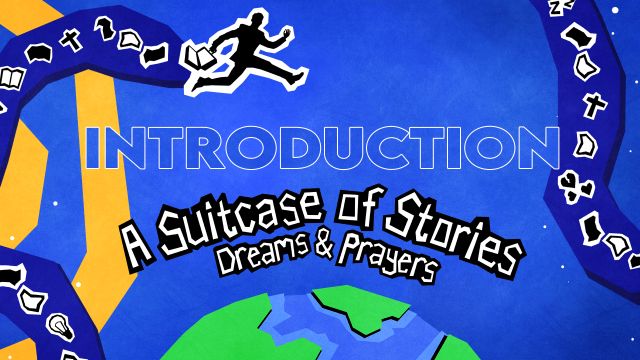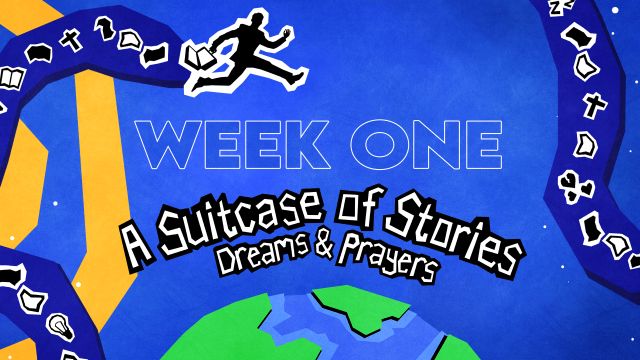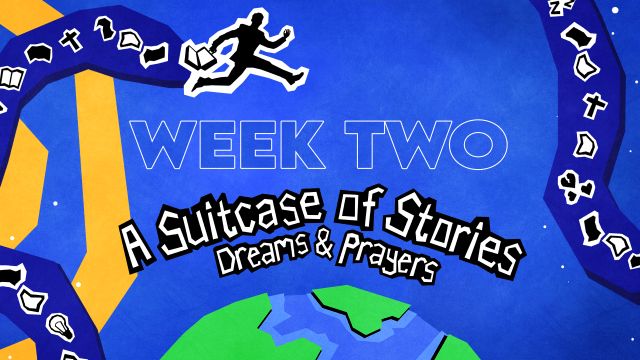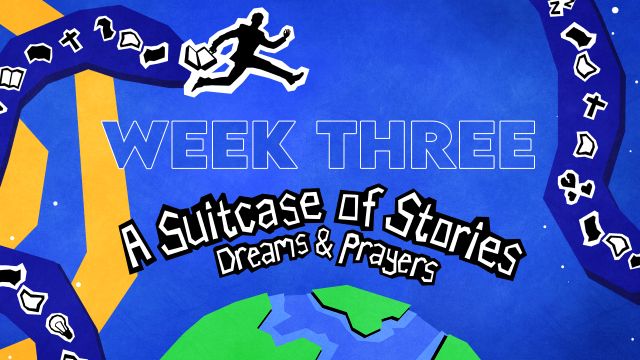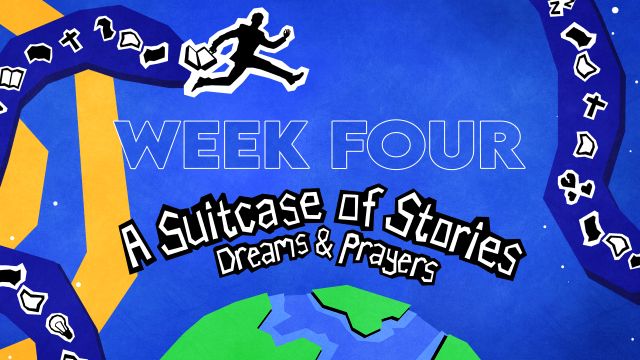A Suitcase of Stories, Dreams and Prayers - Connect Groups
Introduction
Introduction

During the next four weeks we continue to follow the lectionary using each week’s readings to focus on a story, a throw away phrase, a dream, or a prayer in order to help us understand how God speaks to us and guides us in our lives.
- One man’s story may well open up a door into a greater understanding of ourselves and others.
- Our dreams may well be God using our subconscious mind to reflect on the importance of a decision.
- There are often more truths expressed in a throwaway line than in a theological treatise.
- Prayer often opens us up to new horizons and the wideness of God’s mercy and compassion.
We each have a cosmic suitcase that fills with our own stories, dreams, throwaway lines and prayers as we travel through time learning what it means to be God’s — on into eternity!
Let’s get packing!
Find how to get involved: Connect group Blog
Week One
Part 1: The Power of a Story
Read Psalm 78: 1-6, 17-29
 In Psalm 78 we’re encouraged to remember the stories of places and people who have shaped our lives.
In Psalm 78 we’re encouraged to remember the stories of places and people who have shaped our lives.
Is there a story behind a friendship that means a lot to you? Can you share it?
Read Ephesians 4: 1-16
Are you using the gifts you have been given for the building up of God’s people?What are examples of things you could do over the coming weeks to work towards unity?
Read Exodus 16: 1-20 and Philippians 4: 4-9
We’ll end this section thinking about gratitude.
What do you think of the complaints of the Israelites in Exodus? And what do you think of Paul’s advice in Philippians?
And what do you make of the maggots?
Week Two
Part 2: A Word Overheard
 Read Read 2 Samuel 18: 5-9, 15, 31-33
Read Read 2 Samuel 18: 5-9, 15, 31-33
In verses 5-9 David is overheard giving orders to ‘Deal gently’ with his rebellious son Absalom. The phrase is revealing for it shows the heart of David as compared to what he is almost certain will happen to his son.
Do you think our throwaway lines have a story to tell? Is it possible that our actions speak louder than the desires of our hearts? Look at Romans 7: 19. How can we make our heart’s desire to do good be reflected in our actions?
Read Ephesians 4:25-5:2
“…and be kind to one another, tenderhearted, forgiving one another, as God in Christ has forgiven you.” (4:32 in the NRSV translation)
What does the phrase ‘tenderhearted’ make you think about? How does this link into forgiveness? (See Psalm 103: 13 too.)
In our resource pack for this month we talk about this passage encouraging us to till the “Kingdom soil”. What image does this phrase evoke? How can we tenderly care for the soil of God’s Kingdom?
Read Psalm 23
The keywords right in the middle of this reading are “fear no evil” and variations of this sentiment are overheard throughout the Bible (see John 16: 33 Luke 12: 32).
This psalm is a favourite of many. How do you feel about the imagery? Especially what do you make of the idea that God will step into our lives in the middle of a struggle — and bring party food… (see verse 5)?
Week Three
Part 3: Another King — Another Story and Another Dream
Read 1 Kings 3: 3-15
 What significance should we place on dreams? The Bible has many stories that feature the importance of a dream. Should we take time to reflect upon our dreams and what they are telling us?
What significance should we place on dreams? The Bible has many stories that feature the importance of a dream. Should we take time to reflect upon our dreams and what they are telling us?
Read Proverbs 9: 1-6
Wisdom is linked with food for the soul. In St John’s prologue the meaning implied in the use of the term ‘Word’ (John 1: 1-9) is the wisdom that holds the universe and all things together. This wisdom is personified in Jesus. He is you might say the host in Proverbs now appearing in St John’s prologue as the food and the bread of life (see John 6: 51-58).
As we follow the breadcrumbs, as it were, what do you make of the connection between wisdom and food? Why does Wisdom prepare a meal?
Read Ephesians 5: 15-20
Paul encourages us to enjoy the things of God in our lives, making music and creating melodies of praise to God in our hearts.
If wisdom is the key to a full and joyful life — how can we grow in wisdom? What practical steps can we take in our lives in the coming weeks and months?
Week Four
Part 4: God Cannot be Contained in a Building — the Prayer of Everyman
Read 1 Kings 8: 22-43
 Here Solomon gives us the insight to understand that God is the God of everyman not just of Israel. This idea is developed further in the prophecies of Jeremiah and Isaiah. And Simeon makes this clear in Luke 2: 32 when he talks of Jesus as “the light to lighten the gentiles and be the glory of Israel”. How should this affect the way we respond to people of other faiths?
Here Solomon gives us the insight to understand that God is the God of everyman not just of Israel. This idea is developed further in the prophecies of Jeremiah and Isaiah. And Simeon makes this clear in Luke 2: 32 when he talks of Jesus as “the light to lighten the gentiles and be the glory of Israel”. How should this affect the way we respond to people of other faiths?
Read Joshua 24: 14-21
In this passage we learn that ‘everyman’ has choices to make. There is a power that comes from a prayer of commitment. A moment of choice that becomes a signpost for the rest of life.
Can you think of your moment (or moments) of commitment. How has it affected the choices you have made in life?
Read Ephesians 6: 10-20
In life we have our own personal choices to make. Following Jesus is not just about making the right physical choices. The physical world in Paul’s mind is tied up with a spiritual world that we cannot completely understand. However God has given us spiritual clothes to protect us from the spiritual storms of life.
How would you translate and contextualise the military analogy Paul uses into a 21st century context? What is the significance of the phrase “stand firm”?




